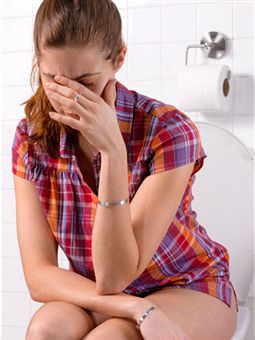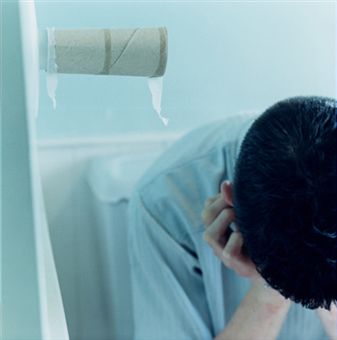The health condition known as constipation can also be called “costiveness,” “dyschezia,” or “dyssynergic defaecation.” It is a topic many people have difficulty discussing. However, almost everyone experiences constipation at least once during his or her lifetime. It is a common gastrointestinal problem that can be both painful and frustrating. However, with some time, effort, and little cost, you can effectively treat your constipation.
Symptoms
Constipation is characterized by the presence of four key symptoms:
1) Infrequent bowel movements – You may be experiencing constipation if you have three or less bowel movements per week.
2) Difficulty passing bowels – more specifically, if you strain during 25% or more of your bowel movements, you may be constipated.
3) Feeling like you didn’t completely evacuate your bowels.
4) Hard stools.

Constipation can also include abdominal pain, vomiting, and a swollen abdomen. Most of these symptoms are not serious and do not require you to see a doctor. Most people deal with minor constipation on their own. However, you should seek the help of your doctor if you exhibit any of these more serious symptoms:
- Blood in your stool
- Your constipation alternates with diarrhea
- Pencil-shaped, thin stools
- Your constipation continues, regardless of corrective changes in your diet and exercise
- Intense abdominal pain
- Unexplained onset of constipation
- Constipation symptoms persist longer than three weeks
Causes
Constipation occurs in your body when your colon, or large intestine, contracts too slowly to propel your stool through. Your colon may also absorb too much water, causing your stool to become hard and dry. This bowel dysfunction in the body can be caused by many different factors. They include:
- Not drinking enough water, or dehydration
- Not eating enough fiber
- Constipation is common in newborn babies after switching from breast milk to formula, or from formula to solid foods.
- Eating too much dairy
- Side effect of medications, which include diuretics, codeine, morphine, and others containing iron, calcium, or aluminum. Some antidepressants can also lead to constipation.
- Psychological causes—some children fear that their stools will be painful, so they withhold them deliberately. Others may feel embarrassed or shy about having a bowel movement.
- Metabolic causes—certain metabolic and endocrine problems can lead to constipation, including hyperglycemia, diabetes mellitus, and hypothyroidism.
- Structural problems in the body, including pelvic floor dysfunction, colon cancer, Parkinson’s disease, and spinal cord lesions.
- Frequent use of laxatives
- Lack of exercise
- Hormonal imbalance
- Changes in routine, including pregnancy, travel, or aging
Risk Factors
Although the majority of people will experience constipation in their lifetime, certain risk factors increase the likelihood you will have it. You are more prone to constipation if you:
Constipation? Get Remedies Fast!
- Are elderly
- Don’t get enough exercise
- Are confined to your bed
- Don’t eat enough fiber
- Don’t drink enough water
- Take certain medications, including anti-depressants, sedatives, narcotics, or medications to treat Parkinson’s disease.
- Are undergoing chemotherapy
Constipation in Children
Constipation is a common problem in children. There are several reasons your children may be experiencing constipation.
Make sure your child is eating enough fiber. If she consumes primarily fatty foods and foods high in sugar, she probably isn’t taking in enough fiber. Try getting her to eat healing foods, like barn cereal, prune juice, and other fruits and vegetables to promote bowel movements.
Children typically experience some constipation when switching from breast milk to cow’s milk, then again when switching from baby food to solid food. Symptoms are usually temporary during these periods.
Your child’s constipation symptoms may worsen, if she resists the urge to pass her bowels. Often, children will fear the next bowel movement because it will hurt. Avoid this harmful cycle by encouraging bowel movements and offer positive reinforcement when your child has successful bowel movements.
If changes in diet aren’t effective in treating your child’s constipation, you doctor might recommend a laxative. Consult with him to determine which type to use and the proper dosage amount for you child.
Prevention Tips
There are many effective strategies to prevent constipation, most of which are completely natural. Following a few simple tips on a daily basis can keep your gastrointestinal system moving as it should.
Drink plenty of water. Dehydration can lead to constipation, so drink six to eight glasses of water each day. You need fluid to move waste matter through the colon properly. Eat plenty of fiber. Fiber helps promote healthy digestion in your body. Foods that are rich in fiber include whole grains, fruits, and vegetables.
Avoid dehydration by reducing your intake of dehydrating beverages, such as soda, coffee, and tea. Limit your consumption of alcohol and dairy products, as they can also dehydrate you.
Exercise on a regular basis. Research suggests that regular exercise helps prevent constipation. Walking after dinner can be especially beneficial. Natural remedy solutions to prevent constipation are available at your health food store. Natural Moves is one such product, which helps to relax your bowel, ease tension, and promote regular bowel movements.
Tests & Diagnosis
Doctors usually diagnose constipation based on a patient’s description of symptoms, including difficulty passing a bowel movement, hard stools, and a feeling of incomplete emptying of the bowels. You doctor will also inquire about your habits, such as dietary intake of fiber and level of daily physical activity. He will consider which medications you are taking, since some drugs can contribute to constipation. In certain cases, however, your doctor may conduct further testing. These procedures can include:
Physical examination. Your doctor examines your abdomen, feeling for substantial lumps of stool in the colon. Rectal examination so your doctor assesses the tone of the anal sphincter and checks for stool in the lower rectum.
Constipation itself is relatively simple to diagnosis, but your doctor may conduct further testing to determine the underlying cause of your constipation and to rule out a more serious condition. These can include:

Blood tests to see if a hormone imbalance is contributing to your constipation. Barium testing, during which your doctor coats the intestine with a dye so that he can clearly see your colon on an X-ray.
With this test, your doctor can tell if you have a more serious bowel obstruction.
Colonoscopy will be done to look for any obstruction in the colon. Your doctor examines the colon with a long, flexible tube equipped with a camera.
This procedure allows him to look for obstructions, tumors, or other abnormalities. You are typically put to sleep under general anesthesia during this procedure.
Anorectal manometry is when your doctor inserts a flexible tube into your rectum that has a small balloon on its tip. He then inflates the balloon and pulls the device back through the sphincter muscle. Your sphincter is the muscle you use during bowel movements, and this procedure enables your doctor to measure its coordination.
Doctors find that patients suffering from constipation usually exhibit one of two conditions:
- Colonic Inertia is a physical condition in which your colon doesn’t contract properly, retaining stool.
- Obstructed defecation is a condition in which you strain more than you need to during a bowel movement.
If you experience chronic constipation and pain for several days each month, lasting three or more months, your doctor will typically diagnosis your condition as Irritable Bowel Syndrome (IBS).
Treatment Options
Most people can relieve their constipation with simple changes in diet and lifestyle. The following options should be the first step in treating your constipation. They are the least expensive methods, carry no risks or side effects, and are completely natural. These changes include:
- Increasing your fiber intake. Eat more high-fiber foods like grains, fruits, vegetables, and beans. Limit your intake of foods low in fiber, such as meat, dairy, and processed foods.
- Exercising. Regular physical activity will promote a healthy intestinal system.
- Allowing time for bowel movement. Give yourself the time for undisturbed trips to the restroom, and don’t ignore the urge to have a bowel movement.
- Drinking more water. Adequate fluid intake will help keep your stools soft.
Another natural option for the treatment of your constipation includes a variety of alternative approaches. These treatments have not been tested extensively by the medical community, but you might find them worth a try. They include:
- Homeopathic remedies. A holistic doctor might recommend using the herb bryonia to soften your stools or sulfur for difficult or painful bowel movements. Other herbs that may help with constipation include euphorbia kansui, castor oil plant, morning glory seeds, and cistanche.
- Healing supplements, which include sodium sulfate, agar, and Irish moss.
- Acupuncture. It’s a traditional Chinese medicine that involves inserting needles into various parts of the body. Some say it helps stimulate the colon and relieve pain caused by constipation.
- Massage. Manipulating and rubbing the abdominal area can help relax the muscles around the intestines and help promote healthy bowel movements.
You could also use over-the-counter laxatives to help treat your constipation. Be careful, though, because they can be habit-forming. There are several different types of laxatives.
- Fiber supplements are your safest option for laxatives. Start with them, and if they don’t work, move on to other types of laxatives. Examples include FiberCon, Metamucil, and Citrucel.
- Saline laxatives should be your next option. They are relatively safe and carry a lower cost than other laxatives. Examples include milk of magnesia and Haley’s M-O.
- Stool softeners do just that—soften your stool. Examples include Colace or Surfak.
- Osmotics help move fluid through your colon. Examples include Cephulac and Miralax.
- Stimulant laxatives cause contractions in your colon and include Dulcolax and Senokot. Use these only if necessary, since they can be very habit-forming and can aggravate your symptoms.
If lifestyle changes and over-the-counter laxatives aren’t relieving your constipation, your doctor might prescribe something more potent.
- Chloride channel activators contain the ingredient lubiprostone, which increases the amount of fluid in your stool. Amitiza is one example.
- Prucalopride is a 5-HT-4 agonist, which increases fluid secretion in your intestine and decreases transit time through the colon.
If medication still does not relieve your constipation, your doctor might use a physical intervention. He may use an enemaa or manual disimpaction, during which he would physically remove impacted stool from your colon using his hands.
If you are still suffering with constipation after medical treatment, your doctor might recommend surgery. He would remove part of your colon, including the parts of your rectum and anal sphincter that are causing the problems.
Medical professionals estimate that everyone will experience constipation at some point during his or her lifetime. It typically isn’t serious and can be treated with minimal cost, time, and effort. If you do experience significant constipation lasting several weeks or longer, be sure to consult with your doctor.

1 Comment
Age27,9years,iam suffering from ibs related program like mucous problem in colon & stool,bloating,flatulence,also incomplete evacuation or dyssenergic defficiency.6 years back i have done colonoscopy,it was normal,3 months back a test done is vit-b12</=113.(normal is 180-914pg/ml),after taking injection i feel improvement from daily dose to weekly dose to monthly,6 months are pending to take remaining injection b-12.but still i am suffering mucous problem.my stool analysis is color=yellowish,appearance=semi solid,mucus=present,ph=acidic,occult blood=negative,ova=absent,cyst=absent,pus cell=2-3/hpf,rbc's=absent,others=food particles present,bacterias present.now 2 days back consulted another gastro clinic,i told all my problem then he told to take colonoscopy again also prescribed some tablets(cibis for 2 weeks)+softovac bowel regulator,+(mesacol suppository not to taken by mouth throgh anus only),and he told me try these medicines 2 weeks,&also told your wish to do colonoscopy or not.i understood one thing cibis tablet is used for elemenating h pylory bacteria.after reaserch on internet may be i have h pylori.